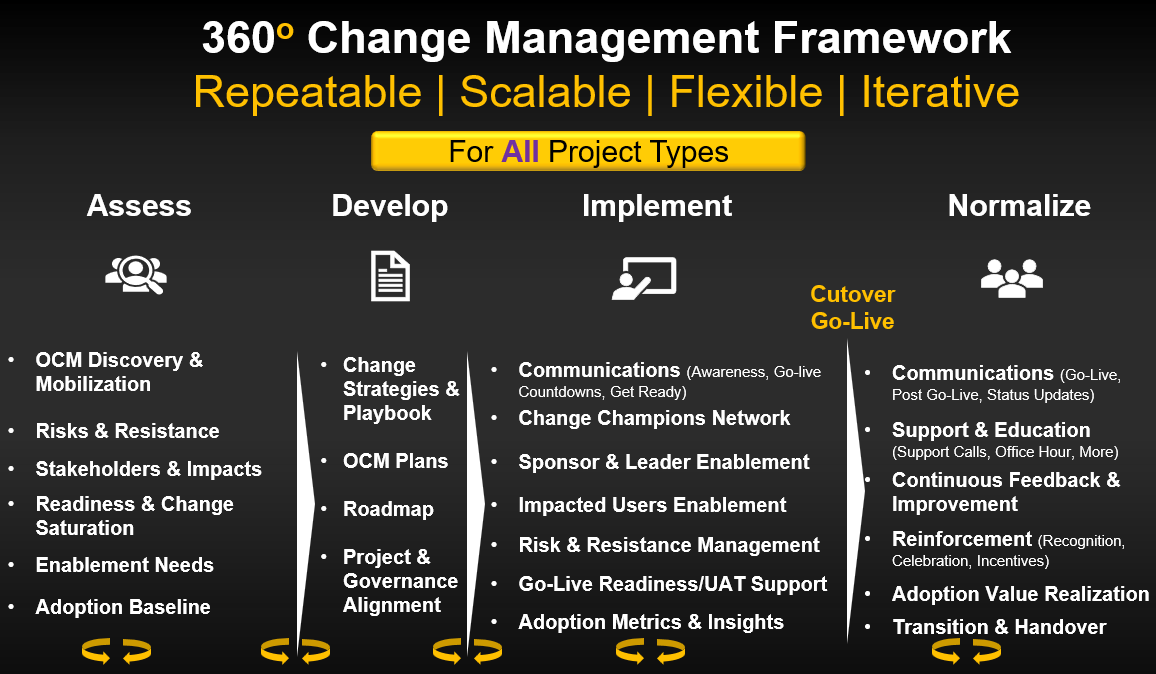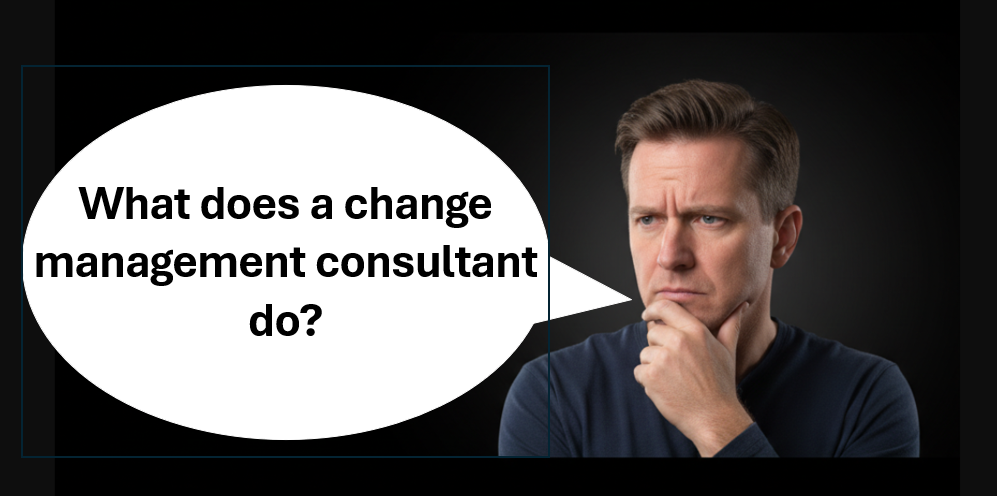What Does a Change Management Consultant Do? | Roles, Skills & Impact Explained
Overview: What Is a Change Management Consultant?
A Change Management Consultant helps organizations successfully plan, implement, and manage change, whether it’s a new technology system, organizational restructure, cultural transformation, or strategic shift. Their goal is to ensure that change initiatives are smoothly adopted, employees are engaged and supported, and business outcomes are achieved without disruption.
In simple terms, a change management consultant bridges the gap between strategy and people, guiding organizations through transitions with minimal resistance and maximum effectiveness.

Change Management Consultant Definition
A change management consultant is a professional who specializes in analyzing how changes impact people, processes, and systems, and then developing strategies to help organizations adapt and thrive.
They use proven frameworks like ADKAR, Kotter’s 8-Step Model, and Prosci Methodology to build readiness, manage communication, and reduce resistance to change.
What Does a Change Management Do? Key Responsibilities of a Change Management Consultant
Here’s what a change management consultant typically does on a day-to-day basis:
1. Assess Organizational Readiness
They evaluate the company’s culture, leadership alignment, and employee sentiment to determine how ready the organization is for change.
2. Develop Change Strategies
Consultants create a comprehensive change management plan that outlines communication, training, stakeholder engagement, and resistance management strategies.
3. Facilitate Communication
They ensure all stakeholders, from executives to frontline employees, clearly understand why the change is happening, how it affects them, and what success looks like.
4. Design and Deliver Training
Change consultants often lead or coordinate training programs that equip employees with the skills and knowledge needed for the new environment or system.
5. Monitor Progress and Adapt
They track adoption metrics, survey feedback, and performance data to evaluate whether the change initiative is achieving its objectives, then adjust strategies as needed.
6. Manage Resistance
One of their most critical roles is identifying sources of resistance and developing methods to reduce pushback through coaching, communication, and support.

⚙️ Examples of Change Management Projects
A change management consultant may be hired to support:
-
Digital transformation initiatives (e.g., new CRM or ERP implementation)
-
Mergers and acquisitions integration
-
Company restructures or leadership changes
-
Process optimization or automation efforts
-
Cultural shifts (e.g., moving to hybrid work models)
-
Regulatory or compliance changes
🧠 Core Skills and Competencies of Change Consultants
To succeed, change management consultants must combine analytical, interpersonal, and strategic skills:
| Skill | Description |
|---|---|
| Communication | Explaining complex change concepts clearly and persuasively |
| Emotional Intelligence | Understanding employee reactions and managing resistance |
| Project Management | Aligning change activities with business timelines |
| Stakeholder Engagement | Building trust across all levels of the organization |
| Data Analysis | Measuring change effectiveness and adoption rates |
| Coaching & Facilitation | Guiding leaders and teams through transition |
👥 Who Hires Change Management Consultants?
Organizations across industries hire change management consultants when they’re undergoing significant change, especially when internal teams lack the experience or capacity to manage the transition effectively.
Typical clients include:
-
Corporations implementing new technology systems
-
Government agencies undergoing policy shifts
-
Healthcare organizations adapting to regulation or technology
-
Nonprofits restructuring or expanding programs
-
Startups scaling operations rapidly
📈 Why Change Management Consultants Are Essential
Without proper change management, even the best business strategies can fail. Studies show that over 70% of major change initiatives fail due to poor communication, lack of leadership buy-in, or employee resistance.
A skilled change management consultant helps prevent that by:
-
Aligning leadership and vision
-
Increasing employee adoption rates
-
Reducing productivity dips during transition
-
Sustaining change over the long term
In essence, they turn disruption into opportunity.
🎯 How to Become a Change Management Consultant
If you’re interested in becoming one, here’s a roadmap:
-
Education – Bachelor’s or Master’s in Business, Psychology, HR, or Organizational Development.
-
Experience – Gain exposure to project management, HR, or consulting.
-
Certification – Earn credentials like Prosci Change Management Certification, CCMP, or Lean Six Sigma.
-
Soft Skills – Develop empathy, communication, and facilitation abilities.
Key Areas of Application for Change Management Consulting
Change management consulting is applied across nearly every industry and business function where transformation, innovation, or organizational evolution is needed. Below are the key areas where change management consultants create measurable impact:
1. Digital Transformation
One of the most common applications, digital transformation involves adopting new technologies such as CRM systems, ERP platforms, AI tools, and automation. Change consultants help manage employee adoption, redesign workflows, and ensure that technology investments deliver real ROI.
2. Organizational Restructuring
When companies merge, downsize, or realign departments, consultants guide leaders and employees through the restructuring process, minimizing disruption, preserving culture, and maintaining morale.
3. Cultural and Behavioral Change
Transforming organizational culture requires more than policies, it requires mindset shifts. Change management consultants design culture programs that promote collaboration, inclusion, agility, and accountability.
4. Leadership Transitions
During executive changes or leadership turnover, consultants provide stability by aligning communication, clarifying vision, and helping employees adapt to new management styles and priorities.
5. Process Improvement and Operational Excellence
Consultants work with operations teams to implement Lean, Agile, or Six Sigma methodologies. Their focus is on embedding continuous improvement behaviors and ensuring staff engagement throughout process changes.
6. Mergers, Acquisitions, and Integrations
M&A activities are complex and emotionally charged. Change consultants align corporate cultures, unify systems, and support employees through uncertainty to ensure successful integration.
7. Human Resources and Workforce Transformation
From new performance management systems to flexible work models, consultants support HR-led transformations by improving communication, engagement, and talent retention.
8. Regulatory and Compliance Changes
Industries such as finance, healthcare, and energy face constant regulatory updates. Change consultants help design and deliver compliance programs that ensure understanding and adherence across all levels.
9. Sustainability and ESG Initiatives
As organizations commit to environmental, social, and governance (ESG) goals, change consultants help drive behavior change, ensuring sustainability becomes part of the company’s DNA.
10. Customer Experience and Service Transformation
Consultants help front-line teams adapt to new service standards, digital tools, or customer engagement models, improving satisfaction and loyalty.
💡 Why These Applications Matter
Every major transformation, whether digital, cultural, or structural, has one thing in common: people must change how they work.
That’s where change management consultants provide immense value, ensuring that change isn’t just implemented, but adopted, embraced, and sustained.
Final Takeaway: The Strategic Value of Change Management Consultants
A change management consultant isn’t just a project advisor, they are a strategic partner who helps organizations move confidently through change.
Their expertise ensures that change is not only implemented but also embraced and sustained, leading to better morale, efficiency, and long-term success.
Note: If you have questions or need change management help and support, contact Ogbe Airiodion (Best Change Management Consultant for Large Scale Projects & Business Transformations). You can also contact the Airiodion Support Team today. Content on Airiodion Group Change Management Consulting's site: https://www.airiodion.com/ is protected by copyright.
A change management consultant helps organizations plan, manage, and implement business changes effectively. They focus on communication, training, and stakeholder engagement to ensure employees adopt new systems, processes, or cultures with minimal disruption.
Change management consulting is essential because it helps organizations reduce resistance, increase adoption rates, and achieve better ROI on transformation initiatives. Without structured change management, projects often fail due to poor communication and lack of employee buy-in.
Top skills include communication, emotional intelligence, stakeholder engagement, project management, training design, and data-driven analysis. These enable consultants to guide people through complex transitions successfully.
Change management consultants are vital for digital transformations, organizational restructures, mergers and acquisitions, process improvement, and cultural change initiatives. Any large-scale change affecting people and processes benefits from professional change management support.
Change consultants work in technology, healthcare, finance, government, manufacturing, education, and nonprofit sectors. Any organization undergoing significant transformation, such as system upgrades or leadership changes, can benefit from their expertise.
Most consultants have a Bachelor’s or Master’s degree in Business, Organizational Development, Psychology, or HR. Certifications like Prosci, CCMP, or Lean Six Sigma strengthen credibility and demonstrate professional expertise in managing organizational change.
A change manager usually works internally within one organization, while a change management consultant is an external expert who advises multiple organizations, offering specialized experience and an objective perspective.
Salaries vary by experience, industry, and location. In the U.S., change management consultants typically earn between $85,000 and $250,000 per year, while senior consultants or independent specialists may earn significantly more.
Consultants track key metrics such as employee adoption rates, training completion, productivity levels, and project milestones. They use feedback surveys, data dashboards, and performance indicators to ensure the change is effective and sustainable. What does a change management consultant do?
Why is change management consulting important?
What are the key skills of a change management consultant?
What types of projects need change management consultants?
What industries hire change management consultants?
What qualifications do you need to become a change management consultant?
What’s the difference between a change manager and a change management consultant?
How much do change management consultants earn?
How do change management consultants measure success?

